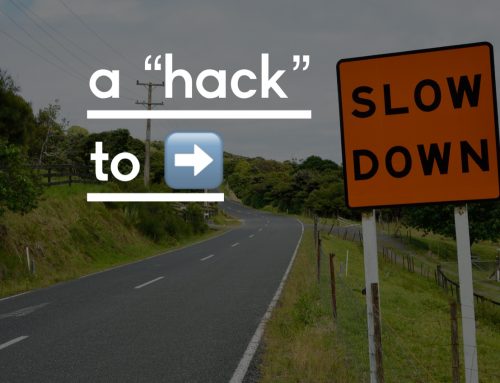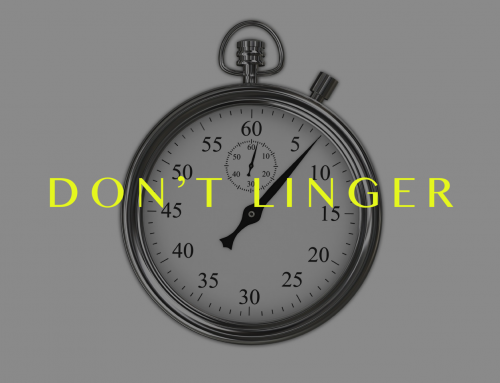Expect Success

No matter the setting, small talk will follow you around for the rest of your life. You might be at your child’s little league game, a cocktail party, or even on line at the grocery store; wherever you are, there’s a chance somebody will want to have a chat. Of course, there’s no setting that leads to more small talk than a networking event.
First, if you think a networking event is “stupid” and a “waste of time” it will be nearly impossible to make positive connections. Networking events can be intimidating and frustrating. Typically, they’re after a long day of work and you’re tired. Plus, you may have already gone to five that month and none produced any leads. Sometimes attending one of those events is the last thing on earth you want to do. But they’re important, and since you’ve already decided to attend you might as well bring the best version of yourself. Besides, it only takes one good interaction to change your life. And if that doesn’t happen, you’ll at least get food and drinks and maybe make a new friend. Reframe your brain before you walk in the door and be optimistic and confident.
The first rule of a networking event is to avoid looking desperate. Walking into that room with the pressure of needing to land a job or secure investors is a recipe for failure. Give yourself that magical pep talk we just discussed and enjoy the moment. You’d like to come from a position of power, but if you can’t manage that try to come from a position of gratitude. Look at the experience as a way to make meaningful connections that may pay long term dividends; not as an immediate cure to your professional problems.
Do you know the saying about having two ears and one mouth, and how you should listen twice as much as you speak? Well, you should strive to do much more listening than talking in any conversation. After all, if you talk the whole time what can you learn? You already know everything about what you’re saying, so how can you get any value from that? Trust that you’ll have a chance to talk about yourself, but really focus on your active listening and non-verbal skills. Ask open-ended questions, listen to the answers, and ask thoughtful follow-ups. Be fully present in the conversation with your words and actions and you’ll make an impact on the person talking to you. As mentioned earlier, perhaps that impact will lead to the two of you doing business together and maybe it won’t. Maybe there’s nothing that person can immediately do for you, but you can help them via your connections. It feels good to help somebody else succeed, and you certainly want that kind of karma in the universe.
When the inevitable time comes to answer the “What do you do?” question, you’ll most likely break out the short (or medium) version of your elevator pitch. During casual conversation nobody wants to be lectured. All you’re trying to do is generate an enthusiastic back and forth, and who knows where it will lead. To do this, you must be able to effectively and concisely explain what you do and make it sound interesting.
The short form of my elevator pitch was always some version of, “I’m a public speaking and media coach, with 20 years of TV hosting experience, and I use that experience to help my clients become dynamic communicators across multiple platforms.” That would lead to follow up questions and give me an opportunity to share the rest of my pitch.
Another way to answer the “What do you do?” question is by asking a question of your own. You can say, “Let me ask you this. Is there anything more annoying than losing your remote control? Well, I’ve created an app that helps you find it with one touch of a button.” That pitch is short enough and interesting enough to propel the conversation, and you don’t sound like a salesman!
You can even use visuals to help explain what you do. If indeed you’ve created that app, don’t just tell people what it does, take out your phone and demonstrate how it works. Before you know it, they may download your app onto their phones. Now you’ve gotten them to buy in to what you’re selling, and they may not even realize they’ve done it.
Whatever you say, remember how you say it is equally as important. Smile and be excited about who you are and what you do. People gravitate to smiles and your smile will often make them smile. If you don’t believe me, try it and watch what happens.
As for how to end a conversation, that can certainly be awkward. We’ve all experienced those conversations that reach their natural stopping points but just can’t seem to end. Rather than grapple with something clever to say that makes things more awkward, simply tell the person it was nice chatting with them, and you hope to chat with them again soon. There’s nothing wrong with that and it’s certainly better than telling them you’re going to see if your car is parked illegally or that you need to use the bathroom. Keep your bladder issues, real or fictitious, to yourself. When you say goodbye, offer your business card and ask for one in return. If you want to stay in contact with someone it’s always good to get their card so you’re not waiting on them to reach out to you. That can be an exercise in frustration. Graciously exchange cards and say goodbye.
There’s no need to set up a formal email exchange or ask them when they’d like to speak over the phone; it sounds a touch needy and we’re trying to avoid giving off that impression. That said, you should certainly reach out in the next couple of days, so you don’t lose the momentum you built at the event. With any luck, one of the interactions you made while networking will lead to a job interview.
If you’d like to work on your on networking skills and your elevator pitch, just reach out to me here.
Have a great day!
Dave




